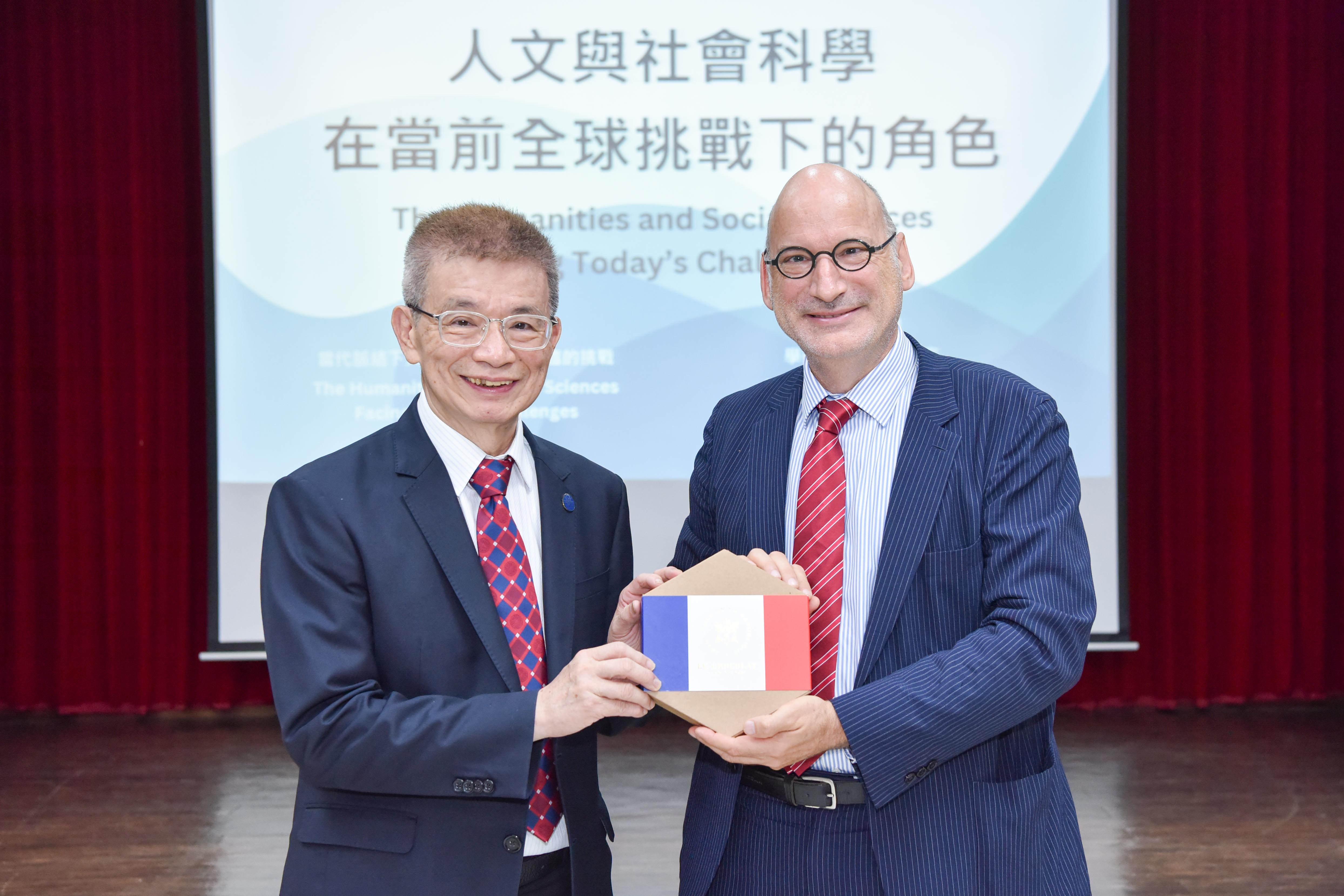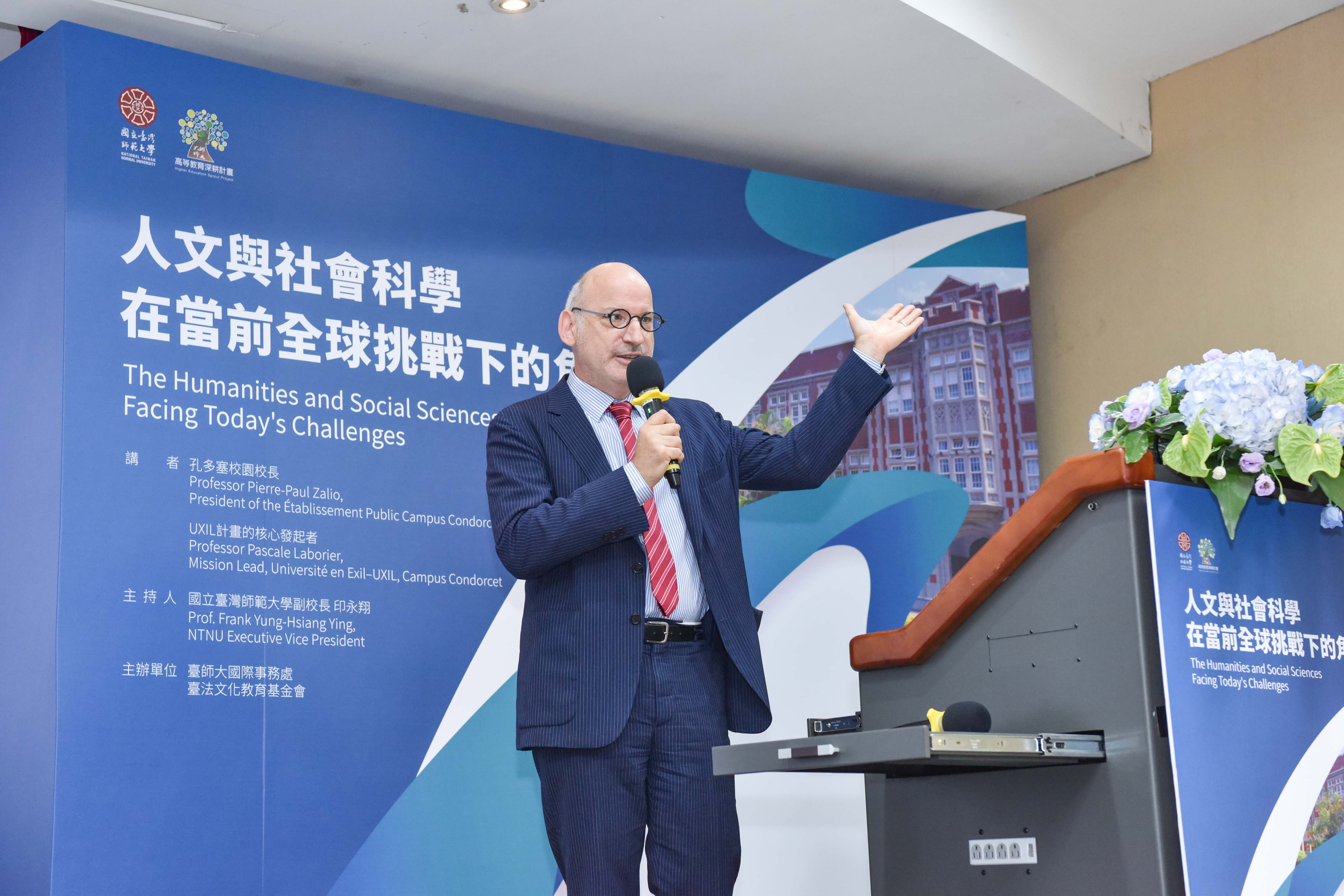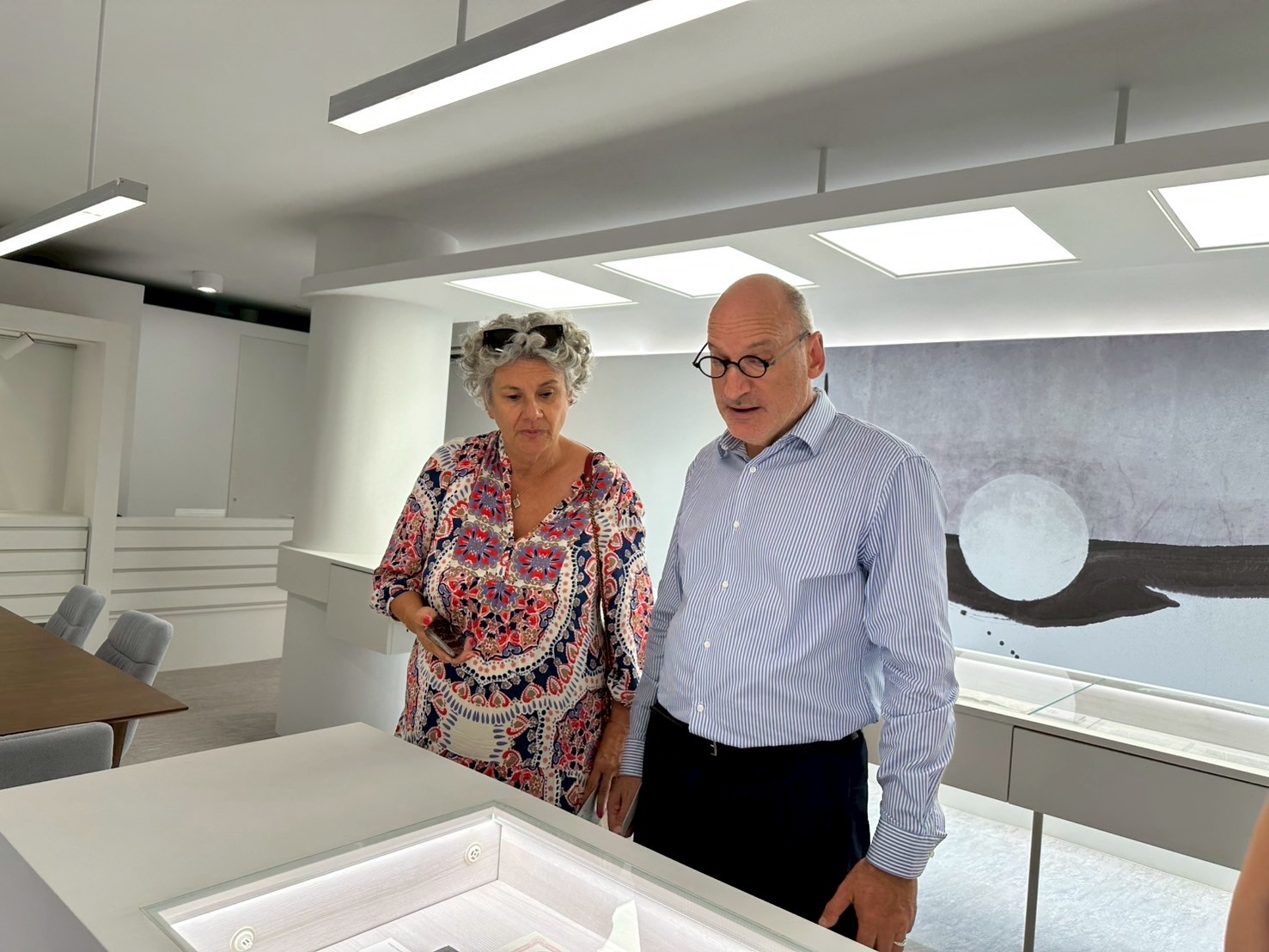Campus Condorcet Visits NTNU to Discuss Global Challenges in the Humanities and Social Sciences
On Friday, September 5, 2025, Prof. Pierre‐Paul Zalio, President of the Établissement Public Campus Condorcet (EPCC) and the Conseil Présidentiel de la Science of France, together with Prof. Pascale Laborier, core initiator of the Universities in Exile (UXIL) program at Campus Condorcet, visited National Taiwan Normal University (NTNU). They delivered a special lecture at the Continuing Education Building, titled “The Humanities and Social Sciences Facing Today's Challenges.” The event was attended by NTNU President Prof. Cheng Chih Wu, Executive Vice Presidents Prof. Yao-Ting Sung and Prof. Frank Yung-Hsiang Ying, VP for Academic Affairs Prof. Mei-Hui Liu, VP for Student Affairs Prof. Mei-Chun Lin, VP for Research and Development Prof. Ying-Shao Hsu, VP for International Affairs Prof. Yi-De Liu, Deans, Associate Deans, Faculty, Students, and Administrative Staff, totaling nearly eighty participants. The gathering highlighted NTNU’s leadership and international collaboration in the humanities and social sciences.
Cross-Disciplinary Research and Contemporary Challenges: Prof. Zalio on Campus Condorcet and the Social Sciences
Prof. Zalio introduced Campus Condorcet, which unites 11 academic institutions, more than 12,000 researchers and students, and 116 research centers. The campus hosts over 900 international conferences and cultural events annually. Its core facility, the Humathèque library, houses over one million documents and is renowned for its Asian studies and Chinese collections. Prof. Zalio emphasized the campus’s commitment to cross-disciplinary research, support for exiled scholars and artists, and fostering social engagement through the Humanities and Social Sciences Festival.
In his lecture, Prof. Zalio traced the evolving role of social sciences across historical periods. He noted that postwar France viewed social sciences as essential for national reconstruction and policy-making. Today, however, in the U.S. and Europe, social sciences face criticism and scrutiny due to associations with diversity, equity, inclusion, and “woke” culture, weakening their public and critical roles. He identified three major challenges: the dominance of behavioral sciences and AI-driven methods, the erosion of academic authority amid digitalization and data proliferation, and the pressures of globalization and ecological crises fostering a “second modernity.” To address these challenges, he proposed strategies including rebuilding collaboration between social and natural sciences, promoting methodological innovation, and establishing platforms for dialogue with civil society.
Promoting Academic Freedom and Cultural Diplomacy: Prof. Laborier on Global Practices
Prof. Laborier presented on “Academic Freedom and Cultural Diplomacy,” highlighting global challenges to academic freedom. She noted that nearly half the world’s population lives in countries with restricted academic freedom, where scholars and students frequently face attacks, and artistic expression is often infringed. France and Taiwan rank highly on academic freedom indices.
She introduced the UXIL program and the PAUSE initiative, which support persecuted scholars and artists through international academic networks and residencies, promoting cross-disciplinary research and global exchange. Since 2017, PAUSE has supported 681 researchers and artists from 44 countries, spanning diverse disciplines with gender balance, while organizing international conferences and exhibitions. Prof. Laborier emphasized that despite limited funding and political or administrative pressures, international collaboration is essential for academic freedom and cultural diplomacy, and Taiwan’s participation contributes positively to these efforts.
Interactive Dialogue: AI, Social Sciences, and International Academic Exchange
The session concluded with remarks from NTNU Executive Vice President Prof. Frank Yung-Hsiang Ying. He noted that the lectures inspired faculty and students to reflect on the evolving role of the humanities and social sciences, as well as the importance of academic freedom and cultural diplomacy. He emphasized that despite technological changes and ideological challenges, the humanities and social sciences remain essential in promoting democratic dialogue, cultural understanding, and international cooperation. Academic freedom reminds us that universities are not merely research spaces but active participants in society and international relations. The exchange underscored the value of cross-border, interdisciplinary dialogue and aligns with NTNU’s mission to deepen international collaboration and research in the humanities and social sciences.
Visit to the Gao Xingjian Center: Strengthening Taiwan-France Cultural and Educational Exchange
Following the lecture, the Campus Condorcet delegation toured NTNU with Prof. Yi-De Liu and student goodwill ambassadors, visiting the Gao Xingjian Center, the Mandarin Training Center, the NTNU French Center, and other campus highlights. The tour focused on the Gao Xingjian Center, honoring the 2000 Nobel Laureate for Soul Mountain, who has lectured at NTNU since 2012. Two years ago, Gao donated 600 valuable works to the NTNU Library, leading to the establishment of the Center, which now exhibits rare manuscripts, including previously unreleased Soul Mountain materials. Gao, exiled to France for political reasons and a French citizen, created many significant works in a free environment, received the French Legion of Honor, and became the first Chinese-language Nobel Laureate in Literature.
This visit reinforced the themes of the lecture, aiming to foster deeper academic and cultural exchanges between Taiwan and France, and further strengthen bilateral cultural and educational cooperation.




